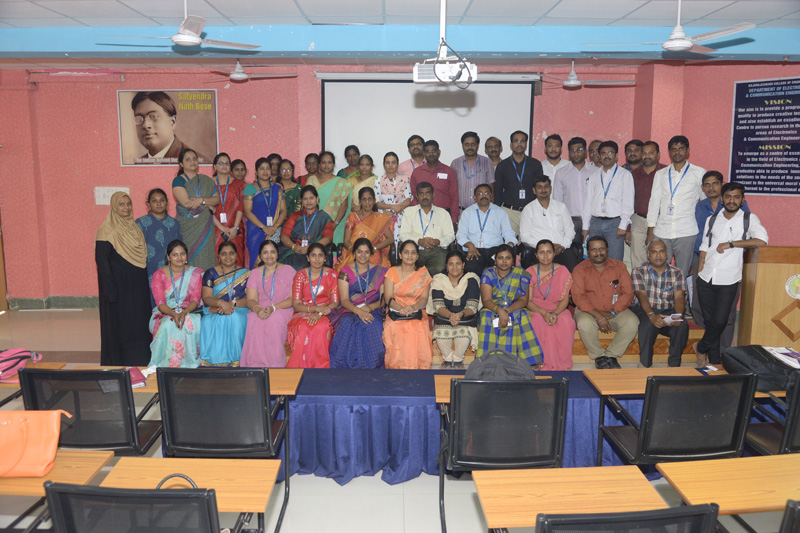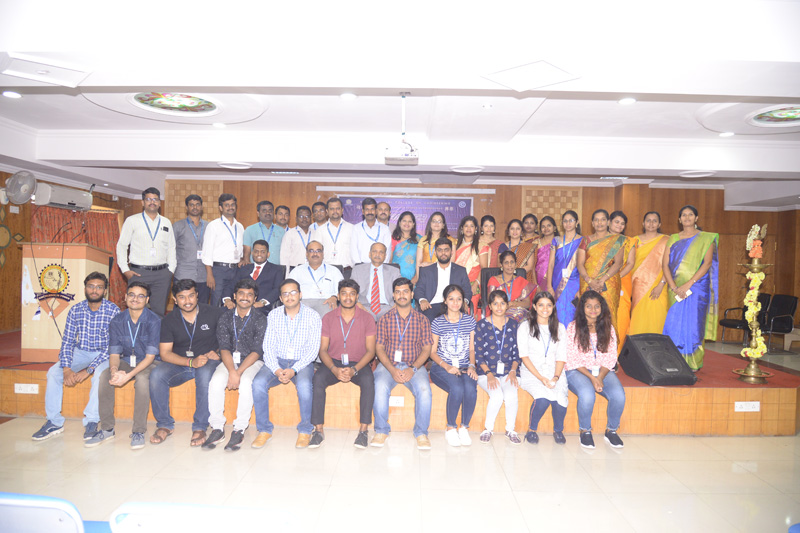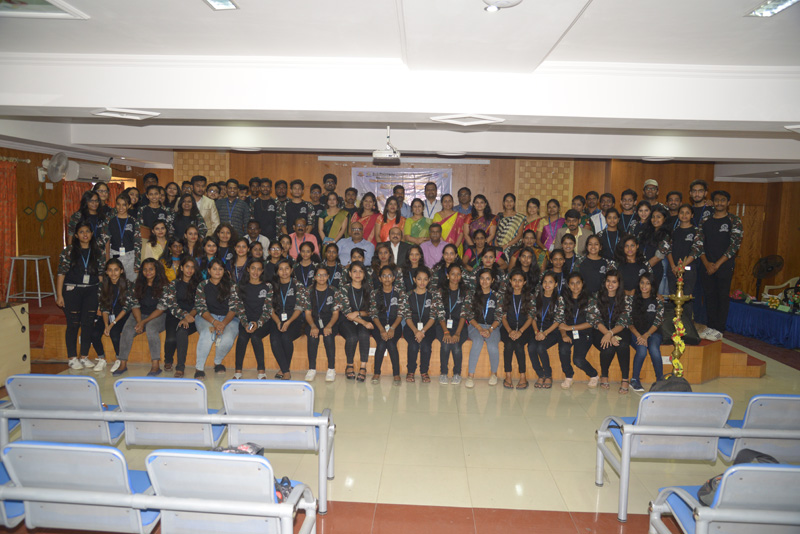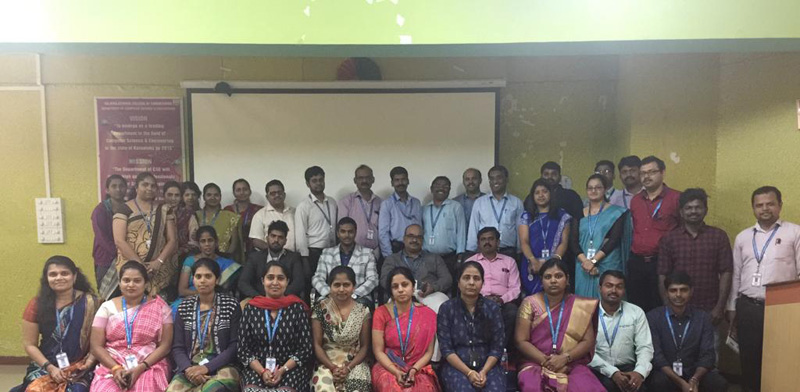Overview
Dept. of CSE was established in 2006 with an intake of 60. It has been raised to 120 in the year 2013-14 and now to 180 in the year 2015-16. CSE department is rich enough to organize and encourage Students, teaching & non-teaching staffs by conducting various events like workshops, Technical seminars, expert lectures, FDPs, industry visits and etc. Postgraduate for CSE was established in 2013 with a an intake of 18,which is affiliated to VTU and approved by All India Council for Technical Education(AICTE). The M.Tech programme in Computer Science and Engineering imparts a breadth of advanced knowledge in various areas of computer science. The programme is designed such that a student can complete it based on advanced coursework alone. However, the students are given the option to concentrate on a problem by substituting some of the courses with equivalent project work. CSE is also having well established Center Of excellence (CoE) in the field of IoT. Currently there is a prolonged growing market for professionals possessing a clear overview of current information and communication networks capabilities, standards and trends, along with a firm grasp of specifics in areas ranging from data network protocols to network security issues.
Today computer industry needs adaptable people who are equally at home presenting business solutions to senior management as finding the fault in a piece of code. This course is ideal for those who see their initial career in a wide-ranging role. Work should include IT consultancy, IT support, analyst, programmer, hardware engineer, network and system administrator etc.
Vision
To produce competent professionals who drive research, foster innovation, and develop technologies that address global challenges and inspire future generations.
Mission
• To provide a technical education through an effective teaching-learning process to meet the industry requirement
• To teach the process of designing, creating, and using robots to perform a certain task in problem-solving skills up-gradation of knowledge through a project-based approach in collaboration with industries
Course Name
Computer Science and Engineering
Duration
4+ years (UG), 2+ years (PG)
Eligibility
Marks - General
45% in Aggregate
Marks - SC / ST / OBC
40% in Aggregate
Eligibility - Subjects
- Physics & Mathematics along with Chemistry/ Bio technology/ Biology(UG)
- B.E. in Computer Science or Information Science (PG)
Eligibility - Exam
- A rank is must in Entrance Examinations like CET, KRLM, COMED –K, AIET, AIEEE Etc.
- A rank is must in PGCET etc.
Eligibility (Working Professionals)
Eligibility for Working Professional B.E Programs
* Candidates must have a diploma (any Discipline) with a minimum of 50% marks
* Experience Certificate and Salary Certificate are mandatory
* The admission will be processed through the DCET qualifying examination (DCET CODE -E145)
* The work location/ Residence must be within a 50 - 75 km radius of the institution.
Application Form
Application Not Available! Please contact the office!
A+ Accreditation, Approvals, and Recognition
- Approved by AICTE
- Affiliated to VTU
- Approved Research Center
Career Opportunities
Computer Science and engineering graduates are the pillars in the current and emerging information era. Opportunities include pursuing Master of Science programs in reputed Universities of U.S. and taking up research assignments in Hardware, System Software, Computer Engineering, Multimedia, and Net Working and Communications areas. The career opportunities for computer science graduates can be classified into seven categories: programming and software development, information systems operation and management, telecommunications and networking, computer science research, web and Internet, graphics and multimedia, training and support, and computer industry specialists. Some careers require additional formal training or study, and experience working in the field. For example, an MBA degree is helpful to management consultants, a course work in biology and biochemistry is needed for bioinformatics specialists, and an advanced degree in computer science is usually required for data miners.
Activities
KSCST – Funded Projects
Our Strength
Infrastructure
The Department has fully fledged laboratories with latest softwares and systems which supports the curriculum. To enable computer science and engineering students with best faculties to set an in depth practical understanding of their engineering the projects labs are designed. We have well equipped seminar halls, classrooms, departmental library and research center.
- DBMS / COMPUTER GRAPHICS LAB
- SS & CD /USP LAB
- R & D/DS LAB
- COMPUTER NETWORKS/ DAA LAB
- WEB PROGRAMMING / PROJECT LAB
- C LAB
- LOGIC DESIGN /EC/ MICRO PROCESSOR LAB
- MACHINE LEARNING LAB
Calendar of Events
- Even Semester 2024–2025
- Odd Semester 2024–2025
- Even Semester 2023–2024
- Odd Semester 2023–2024
- Even Semester 2022–2023
- Odd Semester 2022–2023
Conference Publications
Patents
E-Content
Knowledge Hub
Department Academics Committee (DAC)
Program Assessment Committee (PAC)
Board of Studies (BOS)
Objectives
Programme Educational Objectives (PEO’s)
- PEO-1: Graduates of the program will possess strong educational foundation in mathematics, science, and computer science & engineering necessary for pursuing career and/ or higher studies in computing as well as other allied professions.
- PEO-2:Graduates with an interest in, and aptitude for lifelong learning will be engaged in learning, understanding, and applying new ideas and technologies as the field evolves to solve engineering problems, design appropriate computing systems that are technically sound economically viable and socially acceptable and be responsible engineering and computing professionals.
- PEO-3:Graduates will be informed leaders, effective communicators who work efficiently with diverse teams, promote and practice appropriate ethical moral and codes.
- PO1: Engineering Knowledge: Apply knowledge of mathematics, natural science, computing, engineering fundamentals and an engineering specialization as specified in WK1 to WK4 respectively to develop to the solution of complex engineering problems.
- PO2: Problem Analysis: Identify, formulate, review research literature and analyze complex engineering problems reaching substantiated conclusions with consideration for sustainable development. (WK1 to WK4)
- PO3: Design/Development of Solutions: Design creative solutions for complex engineering problems and design/develop systems/components/processes to meet identified needs with consideration for the public health and safety, whole-life cost, net zero carbon, culture, society and environment as required. (WK5)
- PO4: Conduct Investigations of Complex Problems: Conduct investigations of complex engineering problems using research-based knowledge including design of experiments, modeling, analysis & interpretation of data to provide valid conclusions. (WK8).
- PO5: Engineering Tool Usage : Create, select and apply appropriate techniques, resources and modern engineering & IT tools, including prediction and modeling recognizing their limitations to solve complex engineering problems. (WK2 and WK6)
- PO6: The Engineer and The World: Analyze and evaluate societal and environmental aspects while solving complex engineering problems for its impact on sustainability with reference to economy, health, safety, legal framework, culture and environment. (WK1, WK5, WK7).
- PO7: Ethics : Apply ethical principles and commit to professional ethics, human values, diversity and inclusion; adhere to national & international laws. (WK9)
- PO8: Individual and Collaborative Team work: Function effectively as an individual, and as a member or leader in diverse/multi-disciplinary teams.
- PO9: Communication: Communicate effectively and inclusively within the community and society at large, such as being able to comprehend and write effective reports and design documentation, make effective presentations considering cultural, language, and learning differences
- P1O: Project Management and Finance: Apply knowledge and understanding of engineering management principles and economic decision-making and apply these to one’s own work, as a member and leader in a team, and to manage projects and in multidisciplinary environments.
- P11: Life-Long Learning : Recognize the need for, and have the preparation and ability for i) independent and life-long learning ii) adaptability to new and emerging technologies and iii) critical thinking in the broadest context of technological change. (WK8)
- PSO-1: Investigate complex problems across various domains, applying appropriate computational techniques to systematic design solutions and evaluate their effectiveness.
- PSO-2:Apply software engineering principles to design and develop high-quality, innovative software systems, utilizing contemporary and emerging information processing technologies.
Programme Outcomes (Pos)
Program Specific Outcomes (PSOs)
Engineering Graduates will be able to:
- Programming in C & Data Structures
- Discrete Mathematical Structures
- Data Structures and Applications
- Computer Organization
- Microprocessor & MicroControllers
- Data Communication
- Unix & Shell Programming
- Analog & Digital Electronics
- Automata Theory
- Computer Networks
- Java & J2EE
- Artificial Intelligence
- Software Testing
- Object Oriented Modelling & Design
- Software Architecture
- DataBase Management Systems
- System Programming
- Operating system
- Software Engineering
- Information Network Security
- AdHoc Networks
- Mobile Computing
- Computer Graphics
- Mobile Application Development
- Python Programming
- Storage area network
- Artificial intelligence and Machine learning
- Big data
- Internet of things
News & Events
- 12
- Jan
- 2026
SCR Activity on “Wealth from Waste, Water Conservation & Organic Farming”
SCR Activity on “Wealth from Waste, Water Conservation & Organic Farming”, organized by the Department of Computer Science & Engineering (CSE), Rajarajeswari College of Engineering (RRCE), was successfully conducted on 12th January 2026
- 22
- Dec
- 2025
Future-Proof Your Career: A Digital Marketing Masterclass
Date: 22nd December 2025 Time: 11:00 AM – 12:30 PM Venue: Dr. APJ Abdul Kalam Hall Speaker Details: Mr. Kautilya Roshan Senior Digital Marketing Trainer & Digital Marketing Strategist Digital Academy 360
- 5
- Dec
- 2025
“Innovex 2025” – College Level Project Exhibition
The Department of Electronics & Communication Engineering, in collaboration with AI&ML, CSE, CSE–IC, CSD, EEE, ISE, Robotics & Automation, and MCA,
- 4
- Dec
- 2025
Mr. Neeraj S from EEE Department, Secures Placement with M/s. Storeys
Mr. Neeraj S, Batch 2026, Department of Computer Science & Engineering (CSE), has secured a prestigious placement offer with a CTC of 33 LPA at M/s. Storeys.
- 3
- Dec
- 2025
Alumni Talk on “Engineering the Future: Career Skills and the AI Evolution from ML to GenAI”
The Alumni Talk on “Engineering the Future: Career Skills and the AI Evolution from ML to GenAI” will be held on 03 December 2025, from 10:30 AM to 12:30 PM at the CSE Seminar Hall, 5th Floor, RRCE
Syllabus
Fund Research Details
| Year | IJ | IC | NC | TOTAL |
|---|---|---|---|---|
| 2024-2025 | 43 | 10 | 07 | 60 |
| 2023-2024 | 52 | 09 | 09 | 70 |
| 2022-2023 | 42 | 06 | - | 48 |
| 2021-2022 | 82 | - | - | 82 |
| 2020-2021 | 56 | - | - | 56 |
| 2019-2020 | 19 | - | - | 19 |
| 2018-2019 | 73 | 01 | 06 | 80 |
| 2017-2018 | 06 | 20 | 02 | 28 |
| 2016-2017 | 32 | 6 | 46 | 84 |
| 2015-2016 | 40 | - | - | 40 |
| 2014–2015 | 34 | 30 | 22 | 86 |
| 2013–2014 | 6 | - | 19 | 25 |
| 2012–2013 | 3 | 1 | - | 4 |
| 2011–2012 | 7 | 12 | 32 | 51 |
| 2010–2011 | - | 1 | - | 1 |
| 2009-2010 | 4 | 3 | 5 | 12 |
| Total | 404 | 80 | 132 | 616 |
Placement Details
| Year | Total number of final year students(Eligible) |
Number of students placed |
|---|---|---|
| 2024-2025 | 151 | 106 (Ongoing) |
| 2023-2024 | 114 | 97 |
| 2022-2023 | 152 | 135 |
| 2021-2022 | 134 | 104 |
| 2020-2021 | 135 | 114 |
| 2019-2020 | 131 | 103 |
| 2018-2019 | 93 | 46 |
| 2017-2018 | 81 | 65 |
| 2016-2017 | 82 | 65 |
| 2015-2016 | 53 | 50 |
Placement Details
- Placement & Training Schedule 2025
- Placement & Training Schedule 2024
- Placement & Training Schedule 2023
- Placement Details AY 2020-2024
- Placement Details AY 2019-2023
- Placement Details AY 2018-2022
- Placement Details AY 2017-2021
- Placement Details AY 2016-2020
















